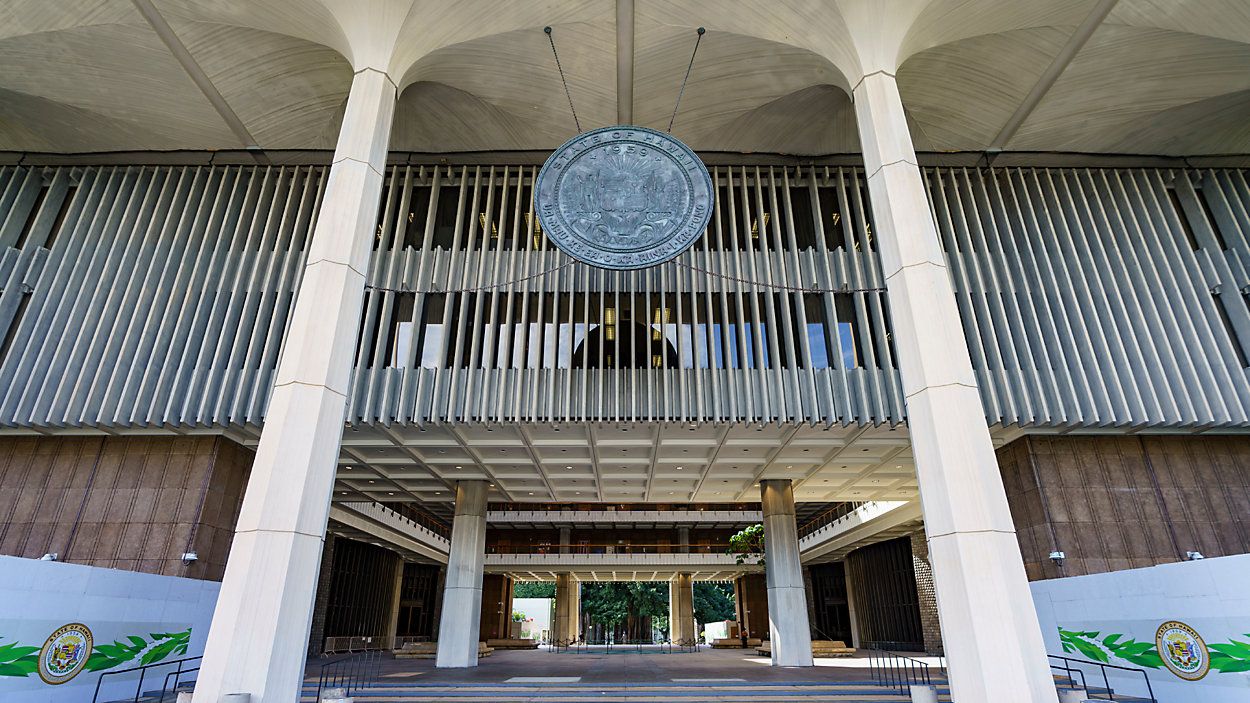The state House of Representatives’ efforts to address corruption and win back public trust continued Wednesday with a committee hearing on 16 measures proposed by the Commission to Improve Standards of Conduct and adopting changes to House rules.
The House Committee on Judiciary and Hawaiian Affairs ultimately recommended eight of the measures for passage on second reading.
The measures included:
House Bill 707: Makes it a class C felony to make false, fictitious or fraudulent claims against the state or a county, or any of their departments or agencies and disqualifies a person from holding elective public office for a period of 10 years upon conviction of making a false, fictitious or fraudulent claim.
HB 710: Establishes the class C felony offense of using or making false statements or entries in matters within the jurisdiction of the executive, legislative, or judicial branch of the State, or any county and disqualifies a person from holding elective public office for a period of 10 years upon conviction of making a false statement or entry.
HB 711: Establishes the offense of fraud as a class B felony and disqualifies a person from holding elective public office for a period of 10 years upon conviction of fraud.
HB 712: Encourages boards to maintain any electronic audio or visual recording of a board meeting as a public record on the board’s website, regardless of whether the written minutes of the meeting have been posted; amends the information that must be included as part of the written minutes of board meetings; and requires boards to provide the state archives with a copy of any electronic audio or visual recording of a board meeting before removing the recording from the board’s website.
HB 717: Prohibits, under certain circumstances, legislators and state employees from hiring or promoting relatives and household members and from making or participating in certain other employment-related decisions and from awarding a contract to or otherwise taking official action on a contract with a business if the legislator’s or employee’s relative or household member is an executive officer of or holds a substantial ownership interest in that business. Imposes administrative fines for violations. The committee recommended amending the measure to focus on establishing a nepotism policy for state employment and to include a section regarding hanai relationships.
HB 723: Expands application of the State’s sunshine law to legislatively appointed bodies, including task forces, working groups, special committees, and select committees; requires the Senate and House of Representatives to hold public hearings on a biennial basis to solicit professional and public feedback on how chamber rules can better effectuate the intent of the state’s Sunshine Law. The committee recommended amendments to clarify which legislative committees must be subject to the Sunshine Law.
HB 724: Amends the prohibition against contributions to a candidate committee or noncandidate committee by state and county contractors to include state and county grantees and the owners, officers, and immediate family members of a state or county contractor or state or county grantee.
HB 726: Prohibits state and county elected officials from soliciting and accepting campaign contributions during any regular session or special session of the state legislature, including any extension of any regular session or special session and any legislative recess days, holidays and weekends.
“The House is appreciative to the commission members who contributed their knowledge in reviewing our existing laws and offering recommendations,” said committee chair Rep. David Tarnas. “We sincerely appreciate the public’s testimony on these measures.”
The remaining eight bills were each deferred because similar bills had already passed second or third readings in the House.
The House also amended the Rules of the House of Representatives, including the operating procedures for the House Committee on Standards of Conduct and the House Administrative and Financial Manual.
The process was overseen by the bipartisan House Advisory Committee on Rules and Procedure, established by Speaker Scott Saiki, to review the rules for the 2023 House and incorporate amendments proposed by the Commission to Improve Standards of Conduct.
“I am appreciative of the members’ extensive work in taking the commission seriously, and implementing the recommendations that were proposed,” said Speaker Scott K. Saiki. “The House remains dedicated to improving the effectiveness, efficiency and transparency of the legislative process.”
House Rules 29.1–29.3 and 62.5–62.6 incorporate committee recommendations relating to ethics reform, ethics disclosures, standards of conduct, and conflict of interest.
“The timeline to finalizing the rules was extended to incorporate suggestions by members and CISC recommendations,” said House Majority Leader Nadine Nakamura. “We have been operating under the existing rules and are now establishing new rules and procedures. After a comprehensive review by the review committee and feedback from all members of the House, we are pleased to share the final rules which highlight improvements in our standards of conduct.”
Minority Leader Lauren Matsumoto, who served on the House Advisory Committee on Rules and Procedure shared her sentiments, “This was a collaborative process and we appreciate the members’ input to ensure that the rule changes reflect the integrity of the House and represent our commitment to improving our standards of conduct.”
Minority Leader Lauren Matsumoto, who served on the advisory committee, echoed the sentiment.
“This was a collaborative process and we appreciate the members’ input to ensure that the rule changes reflect the integrity of the House and represent our commitment to improving our standards of conduct,” Matsumoto said.
The CISC was established in the aftermath of last year’s legislative bribery scandal, which led to the convictions of former Senate Majority Leader Kalani English and former Rep. Ty Cullen for federal honest services wire fraud.
The amended House rules took effect upon approval.
Michael Tsai covers local and state politics for Spectrum News Hawaii.



